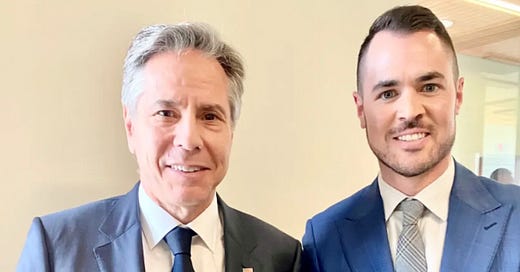Blinken’s Warning Two Years Ago: U.S. ‘Losing Faith’ in Canada’s Ability to Combat Industrial-Scale Fentanyl
BC Mayor Warns of Asian Organized Crime’s Surprising Access to Canada’s Political Class, Echoing US Agency Concerns
PORT COQUITLAM, Canada — In a high-level meeting in 2023—one participant representing the head of state of the world’s most powerful nation, the other a popular small-town mayor in British Columbia—candid warnings emerged about Canada’s capacity to confront the industrial-scale production of fentanyl. Mayor Brad West, a longstanding critic of transnational drug networks in his province, recalls Secretary of State Antony Blinken stressing that Washington believes Beijing is effectively weaponizing fentanyl against North Americans—and that Canada stands out as a worrisome weak link in the global supply chain.
On Tuesday, Prime Minister Justin Trudeau’s government moved to address growing U.S. alarm by appointing former RCMP deputy commissioner Kevin Brosseau as Canada’s new “fentanyl czar.” Announced as part of an agreement to forestall potential American tariffs in a tense trade dispute, the position mandates “accelerating Canada’s ongoing work to detect, disrupt, and dismantle the fentanyl trade,” according to the Prime Minister’s Office. Brosseau, who most recently served as deputy national security and intelligence adviser to Trudeau, will work closely with U.S. agencies to tackle a crisis that has claimed tens of thousands of lives across North America. Still, questions remain about whether he has the standing in Washington—and the authority in Ottawa—to enact meaningful reforms.
West, reflecting on his encounter with Blinken, doubts that incremental measures will suffice. He argues that only bold legislative change, coupled with a willingness to challenge entrenched legal barriers, can dispel the U.S. government’s unease over Canada’s approach. “Secretary Blinken specifically noted the lack of a RICO-style law in Canada,” West said. “He talked about how, in the United States, that law had been used to take down large portions of the mafia. Then he looked at us—one of America’s closest allies—and saw a very concerning weak link.”
According to West, Blinken pointed to China’s role in funneling precursor chemicals into fentanyl labs. He warned that China’s government, if inclined, could stem the flow but has little interest in doing so. “He was incredibly candid and very serious about the threat fentanyl poses to North America,” West recalled. “He confirmed the connection between the Chinese Communist Party, the triads, and the Mexican cartels, telling me these groups are working together—and it’s Canada where they’re finding a safe operating base.”
West says American frustration revolves around high-profile law enforcement stumbles in Canada, notably the E-Pirate investigation into Silver International, an alleged underground bank in Richmond, B.C., believed to have laundered more than a billion dollars a year for global syndicates. Touted as a signal that Canadian authorities could clamp down on transnational money laundering, the case nevertheless collapsed with no convictions. “He expressed genuine dismay that we haven’t secured meaningful convictions,” West said, paraphrasing Blinken. “When our most prominent laundering case ends with zero prison time, you can see why the Americans are alarmed.”
Blinken also conveyed to West that U.S. agencies have grown hesitant to share certain intelligence with their Canadian counterparts.
“He told me that U.S. intelligence and law enforcement are withholding some evidence because they don’t believe we’ll act on it,” West explained. “They’ve lost confidence.”
West added that in ongoing communications, he has learned American officials are shocked that major figures in Asian organized crime “seem to have so much access to our political class. They’re basically saying, ‘What’s going on in Canada?’”





